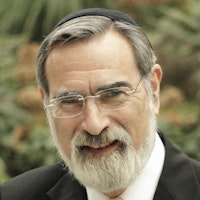Gratitude is the most powerful of human emotions. It is the emotion that turns what we have into enough.
Jonathan Sacks

Gratitude Is
Topic: Gratitude
Gratitude is the most powerful of human emotions. It is the emotion that turns what we have into enough. It is the antidote to envy. It teaches us to focus on what we have, not on what we lack. It is the foundation of all relationships. It is the emotion that binds us to others and creates a sense of community.
Jonathan Henry Sacks, Baron Sacks, was born on March 8, 1948, in Lambeth, London. He became a notable British Orthodox rabbi, philosopher, theologian, author, and politician. From 1991 to 2013, he served as the Chief Rabbi of the United Hebrew Congregations of the Commonwealth, playing a pivotal role in guiding and representing Jewish communities across the region.
Beyond his leadership in the Jewish community, Sacks was deeply passionate about character education, morality, and the importance of family. He frequently emphasized the role of ethical teachings in forming well-rounded individuals and believed in the necessity of strong family bonds for a stable society. An accomplished author, his books often explored the intersections of faith, morality, and contemporary challenges, aiming to make religious insights relevant to a wide audience. These works not only resonated within religious circles but also found acclaim in academic and political spheres due to their timely and profound insights.
Sacks passed away on November 7, 2020, in London. His legacy, marked by interfaith dialogue, advocacy for character education, and a steadfast commitment to the Jewish community, continues to inspire many. He is survived by his wife, Elaine Taylor Sacks, whom he married in 1970.
The Case For God
Sacks, Jonathan. "Gratitude." The Case for God. New York: Hodder & Stoughton, 2009. 53. Print.

Jonathan Sacks
Theme: Gratefulness

About This Jonathan Sacks “Gratitude” Quotation [Commentary]
Rabbi Jonathan Sacks describes gratitude as “the most powerful of human emotions,” because it reshapes our perception of what we have. Rather than seeking more, gratitude teaches us to see our current life as sufficient—“it is the emotion that turns what we have into enough.” This shift does not depend on external circumstances but on an inward change of attention. In a culture often defined by acquisition and comparison, Rabbi Jonathan Sacks points to a different kind of fulfillment rooted in appreciation.
He names gratitude as “the antidote to envy,” a response that redirects us from what we lack to what we have. Envy isolates us by drawing our gaze outward, toward others’ lives. Gratitude returns our focus to our own blessings, reducing the discontent that arises from comparison. As Sacks writes, it “teaches us to focus on what we have, not on what we lack.” In doing so, gratitude supports emotional well-being and a more balanced view of our place in the world.
Sacks also emphasizes gratitude’s role in our relationships. “It is the foundation of all relationships,” he writes, “the emotion that binds us to others and creates a sense of community.” Gratitude strengthens human connection by acknowledging the presence and generosity of others. It nurtures mutual care and belonging. In this way, gratitude is more than an emotion—it becomes a way of seeing, relating, and living with greater awareness of what is already present and shared.
Jonathan Sacks—Additional Quotes from “Gratitude”
Here are a few more passages from Rabbi Sacks’s essay “Gratitude” that specifically focus on gratitude:
These passages highlight Rabbi Sacks’s belief that gratitude is a powerful emotion that can have a profound impact on our lives. When we are grateful, we are more likely to be happy and content, we are less likely to be envious of others, and we are more likely to build strong relationships.
Resources
Related Quotes
Copyright © 2017 – 2026 LuminaryQuotes.com About Us